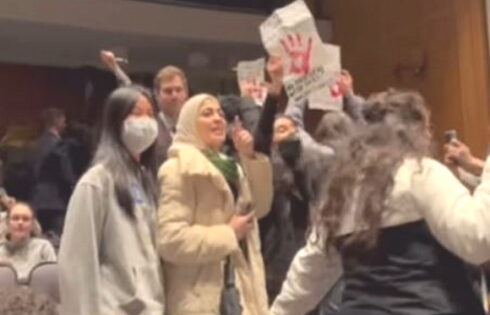
‘Could be a real step forward,’ says civil liberties group
In a win for religious liberty and free speech on campus, the Department of Education released a regulatory proposal to protect the rights of educational religious organizations and students’ First Amendment rights on campus.
“Our actions today will protect the constitutional rights of students, teachers, and faith-based institutions,” Secretary Betsy DeVos* stated in a Jan. 16 press release about the 203-page draft notice of proposed rulemaking. It outlines “five general areas.”
One addresses protections for faith-based students organizations by ensuring their public universities grant them “the rights, benefits, or privileges otherwise afforded to non-faith-based student organizations.”
Institutions could lose their “Direct Grant or subgrant from a State-Administered Formula Grant program” if they impose unique burdens on faith-based groups.
A similar area would revoke federal research or education grants from public institutions that do not act in accordance with the First Amendment, and private institutions that do not “comply with their stated institutional policies” on freedom of speech and academic freedom.
MORE: Trump’s executive order punishes ‘professors and power structures’
The department also wants to “clarify how an educational institution may demonstrate that it is controlled by a religious organization for purposes of Title IX,” since current regulations do not define “controlled.”
DeVos said the rulemaking, which now goes before the public for comment, “will level the playing field between religious and non-religious organizations competing for federal grants,” and protect religious liberty for faith-based colleges and First Amendment freedoms.
Public comments are due Feb. 18, according to the notice published in the Federal Register.
The Foundation of Individual Rights in Education wrote that these proposals “could be a real step forward in the effort to secure free speech, academic freedom, and religious liberty rights,” while cautioning that they could also be misused.
The Department of Education responded to an email from The College Fix but did not provide a backgrounder or other summary documents as requested.
Still hard to lose federal money: ‘final, non-default judgment’ required
The rulemaking proposes two major methods for respecting the rights of religious groups, responding to both Justice Department guidance on religious liberty and the Supreme Court’s ruling in the funding discrimination case Trinity Lutheran.
One would modify the Uniform Administrative Requirements so religious groups can “receive a grant or subgrant under a program of the Department on the same basis as any other private organization,” not be discriminated against, “and strengthen religious freedom protections.”
The other would ensure that a religious group receiving federal money “retains its autonomy, right of expression, religious character, and independence from Federal, State, and local governments.” Both religious and non-religious groups should be eligible to “obtain, use, and keep grant funds” on “equal terms.”
MORE: I called for diversity of thought. My peers compared me to a neo-Nazi.
In announcing award opportunities and contracts, the department would clarify that it won’t “discriminate against an organization” based on religious status. It would make explicit that an organization has the right to “carry out its mission consistent with … the Free Speech and Free Exercise Clauses of the Constitution” while receiving federal funds.
As for Title IX, regulators want to “[a]dd a non-exhaustive list of criteria” by which schools can show they need an exemption from Title IX and its associated regulations in order to remain consistent with their “religious tenets or practices.”
Even as the department plans to condition federal grants or subgrants on public university compliance with the First Amendment, and private university compliance with internal speech policies, it emphasizes that institutions will enjoy full legal protections.
The department will only take away funding if there is a “final, non-default judgment by a state or federal court that the public institution or an employee of the public institution, acting in his or her official capacity, violated the First Amendment,” according to the Jan. 16 press release.
For constitutional obligations, ‘these requirements should be uncontroversial’
The Foundation for Individual Rights in Education previously expressed reservations about President Trump’s executive order on campus free speech last spring, and it did so again for this proposal.
“FIRE has warned against any plan that would turn a college or university’s loss in court into a catastrophic loss in federal funding, for example, because of the distorting impact it would have on the behavior of both colleges and the courts,” Executive Director Robert Shibley wrote Jan. 17.
He pointed to the “outrageous behavior” by colleges when threatened with the “death penalty” – total federal defunding – for violating the Obama administration’s view of their Title IX obligations. That was the subject of Shibley’s short book Twisting Title IX.
The department’s proposed rulemaking does list sanctions and only threatens to rescind grant awards rather than federal student aid, which “reduces” FIRE’s concern but “does not eliminate” it, he said.
But to the extent that the rulemaking proposes conditioning federal grants on “already-existing constitutional obligations, these requirements should be uncontroversial,” Shibley wrote.
Religious students should not be deprived their freedom of association, and “belief-based groups” of any kind should not be forced to jettison “belief-based requirements for members and leaders” in order to receive equal treatment by their colleges.
MORE: Court holds U. Iowa officials personally liable for anti-Christian bias
IMAGE: Dream Perfection/Shutterstock
Like The College Fix on Facebook / Follow us on Twitter






Please join the conversation about our stories on Facebook, Twitter, Instagram, Reddit, MeWe, Rumble, Gab, Minds and Gettr.